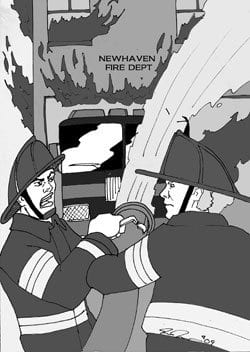
Losing the race
The real message for African Americans from the New Haven firefighters case (Ricci v. DeStefano, et. al.) is that it is time to become more aggressively competitive. Be aware that an action favoring blacks is perforce an inconvenience to others. If remedial action is generally considered to be unfair to whites, then it will harm public support for affirmative action.
Americans are by disposition competitive. When professional baseball teams began the 2009 season, they were all motivated by the prospect of making the playoffs. Everyone naturally wants to win. Undoubtedly, every one of the firefighters who competed in the promotion exams in New Haven in 2003 expected that they had a good chance of coming out on top.
A total of 118 firefighters competed — 77 for promotion to lieutenant and 41 for promotion to captain. The written exam accounted for 60 percent of the score, while the oral exam accounted for 40 percent. Industrial/Organizational Solutions Inc. (IOS) was hired by the city to design tests based upon job analysis for each exam. The written test included 100 multiple-choice questions prepared below a 10th-grade reading level.
The oral examinations were also designed to include only job-related questions. The assessors all came from outside of Connecticut, and all held ranks higher than the positions being tested. Every one of the three-member assessment panels included a white, a black and a Latino.
The city gave applicants three months to prepare for the test. They also provided, at a cost of $500, source materials that indicated the specific chapters from which questions were being taken. Only 34 passed the lieutenant’s exam — 25 whites, six blacks and three Hispanics. And 22 passed the captain’s exam — 16 whites, three blacks and three Hispanics.
Under the civil service rules, promotions must be made from those with the top three scores on the exams. In the lieutenant’s exam, 10 firefighters were eligible for promotion. All are white. In the captain’s exam, nine were eligible for promotion — seven whites and two Hispanics.
Only nine blacks passed the two exams, but none scored high enough to be eligible for promotion. The absence of black firefighters raised a concern with New Haven Corporation Counsel Thomas Ude that the test could be in violation of the anti-discrimination provisions of Title VII of the Civil Rights Act of 1964. That law punishes intentional acts of racial discrimination by disparate treatment, but it also punishes unintentional acts of discrimination as evidenced by disparate impact. Even though there was every attempt to make the firefighters’ exams race-neutral, there was a disparate result because no blacks qualified for promotion.
At Ude’s urging, the New Haven Civil Service Board did not approve the test. Under the prevailing law, a racial disparity of the magnitude of the results of those tests was a prima facie violation of Title VII. The white firemen sued. When the case came before her panel of the U.S. Court of Appeals for the 2nd Circuit, Judge Sonia Sotomayor simply applied precedent and rejected their claim. However, the U.S. Supreme Court ruled that there must be a “strong-basis-in-evidence standard” to render such a decision, especially when the prima facie standard harms others. As a result, Ricci has been reversed and remanded.
It is difficult to accept the conclusion that white firefighters in New Haven are so much smarter than blacks. One must wonder how many blacks paid $500 for the study materials and studied “8 to 13 hours a day” like lead plaintiff Frank Ricci, who had to overcome dyslexia and “several other learning disabilities.”






